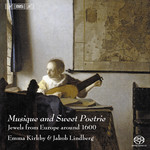
Musique and Sweet Poetrie
 $35.00
Out of Stock
$35.00
Out of Stock2-6 weeks add to cart
VARIOUS COMPOSERS
Musique and Sweet Poetrie
Emma Kirkby (soprano) Jakob Lindberg (lute)
[ BIS / SACD ]
Release Date: Friday 1 December 2006
This item is currently out of stock. We expect to be able to supply it to you within 2 - 6 weeks from when you place your order.
"This exquisite collection of musical gems is arranged so as to represent a tour around musical Europe at the end of the Renaissance. Moreover, on this musical journey we are accompanied by two of the finest musicians around, and by a magnificent lute of c1590 from Augsburg. There is a feast of pleasing musical detail here from both performers, beautifully captured by superb recording techniques."
(Five Stars BBC Music Magazine April 2007)
"Whether from a geographical or a musical standpoint, this is a journey well worth making on disc."
(International Record Review March 2007)
"A thoroughly enjoyable conspectus of lute songs and lute solos from Renaissance Europe, mixing familiar and unfamiliar and played by two modern masters of these forms. There's music here from England, Italy, Germany, France and Poland. Of course the composers concerned were, in many respects, more 'international' than 'national'. Their persons – and their music – crossed many boundaries and many musical exchanges were effected in this period...The recorded sound is perfect; intimate but not over-close. Full texts and translations are provided."
(MusicWeb May 2007)
A unique lute, built by Sixtus Rauwolf in Augsburg around 1590, was the starting point for this very special recital, which incorporates lute songs and solos by composers from different parts of Europe around 1600. Presenting a wealth of forms and national styles - from French airs de cour to Elizabethan pavans and examples of early Italian monody - the disc is a fascinating survey of the musical life of the time. But in the hands of these interpreters it becomes much more than that: Emma Kirkby and Jakob Lindberg, playing his historic lute, bring this music to life with incomparable immediacy. It is as if we were present when Shakespeare first heard Robert Johnson's setting of his 'Full fathom five', Ariel's song from The Tempest, or when Georg Schimmelpfennig, court composer to Landgrave Moritz in Kassel, showed the daughter of his employer the florid solo madrigal 'Dolce tempo passato', set to her own poem.
Some of the names represented on this disc are familiar to all: John Dowland, with three songs, and Heinrich Schütz, with one of his Kleine geistliche Konzerte, a setting of Psalm 70. Others, like Schimmelpfennig or the Antwerp-born lutenist Gregory Huwet, are far less known to the general public. But all of them created musical jewels, which Emma Kirkby and Jakob Lindberg - collaborators of long standing - have gathered together into a glittering diadem encircling a large part of Europe at the dawn of the 17th century.
Tracks:
Robert Johnson:
Almain
Full fathom five thy father lies
Pavan.
Thomas Morley:
Thirsis and Milla
Come sorrow, come.
Gregory Huwet:
Fantasia.
John Dowland:
Shall I sue, shall I seek for grace?
Go crystal tears
Shall I strive with words to move?.
Giovanni Kapsperger:
Toccata.
Georg Schimmelpfennig:
Dolce tempo passato.
Heinrich Schütz:
Eile mich, Gott, zu erretten.
Michelangelo Galilei:
Toccata
Corrente
Volta.
Sigismondo d’India:
Quella vermiglia rosa
Da l’onde del mio pianto.
Robert Ballard:
Entrée de luth
Branles de village.
Pierre Guédron:
Cessez, mortels, de soupirer.
Jean-Baptiste Boësset:
Que Philis a l’esprit léger.
Etienne Moulinié:
Paisible et ténébreuse nuit.
Wojciech (Albertus) Dlugoraj:
Fantasia.
John Danyel:
He whose desires are still abroad
Dost thou withdraw thy grace?
Why canst thou not, as others do?


